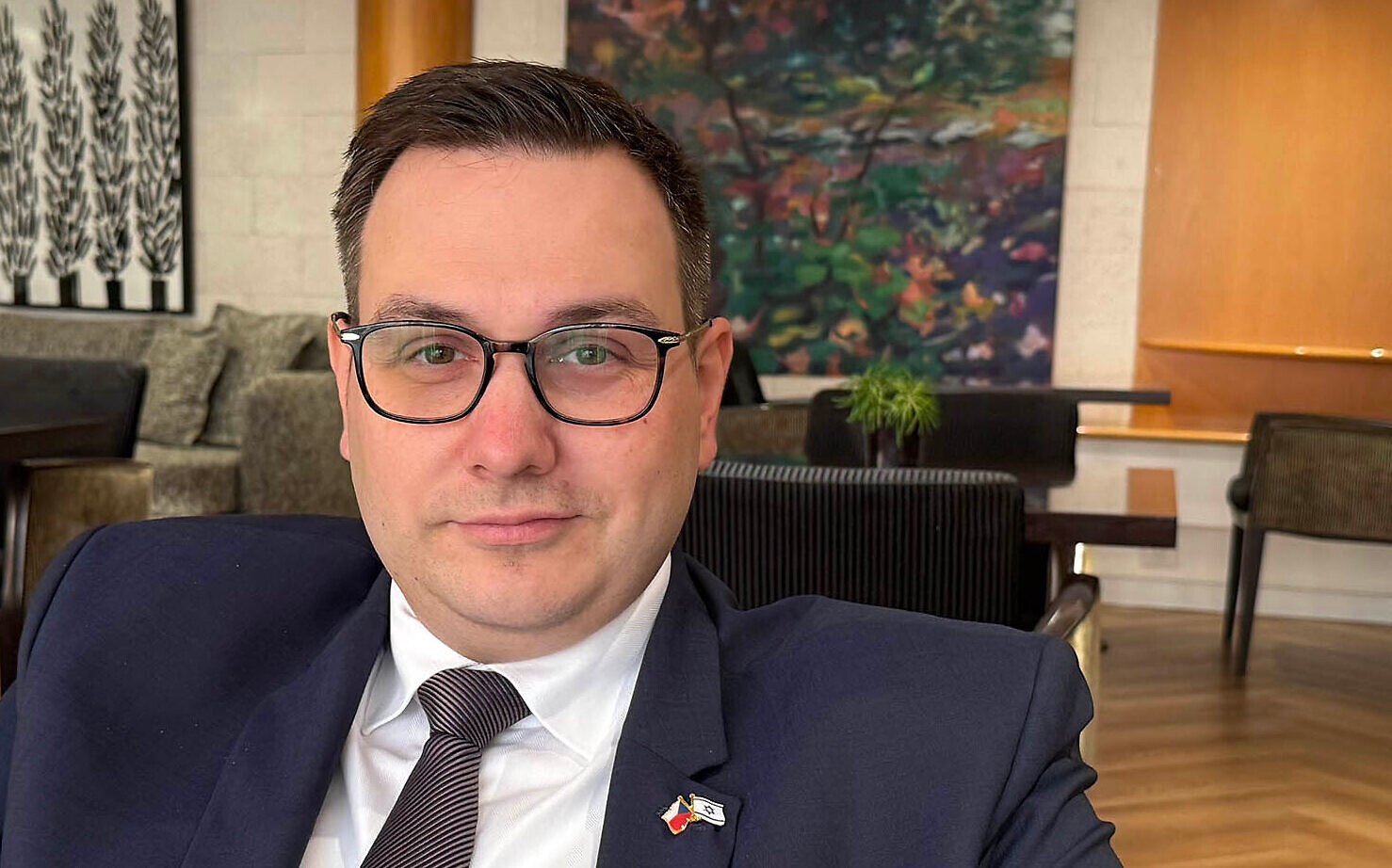There is no chance that the European Union will impose sanctions on Israel over the conflict in Gaza, Czech Foreign Minister Jan Lipavsky told The Times of Israel recently, putting the kibosh on threatened penalties meant to pressure Jerusalem over its policies in the Strip, where fighting has been paused for nearly a month.
According to Lipavsky, who visited Israel Thursday on a single-day trip, Prague and other countries in the 27-nation bloc would head off any attempt by Brussels to impose sanctions on Israel, which counts the EU as its largest trade partner.
“Of course, there are some countries that would like to put sanctions on Israel… But I don’t see any chance that such sanctions would be approved, and not only because of Czechia, but many others [in the EU],” said Lipavsky, who was on his third wartime visit to Israel.
In September, the European Commission presented a proposal for sanctions on far-right Israeli ministers and a partial suspension of Israel’s association agreement with the EU over alleged humanitarian violations in Gaza. The sanctions were not immediately approved, and the effort, which requires unanimous support, remains frozen.
Lipavsky, who is nearing the end of his term as Prague prepares to form a new government, emphasized that Israel has fulfilled agreements reached with the EU on its humanitarian obligations in Gaza and criticized what he described as an “activist” approach of leading EU member states to the Middle East, affirming Prague’s support for Jerusalem.
As Israel navigates the initial weeks of US President Donald Trump’s Gaza peace plan, Lipavsky called Western recognitions of a Palestinian state in the wake of Hamas’s October 7, 2023, attack “a mistake,” and said he has asked Foreign Minister Gideon Sa’ar how his country can contribute to Trump’s plan moving forward.
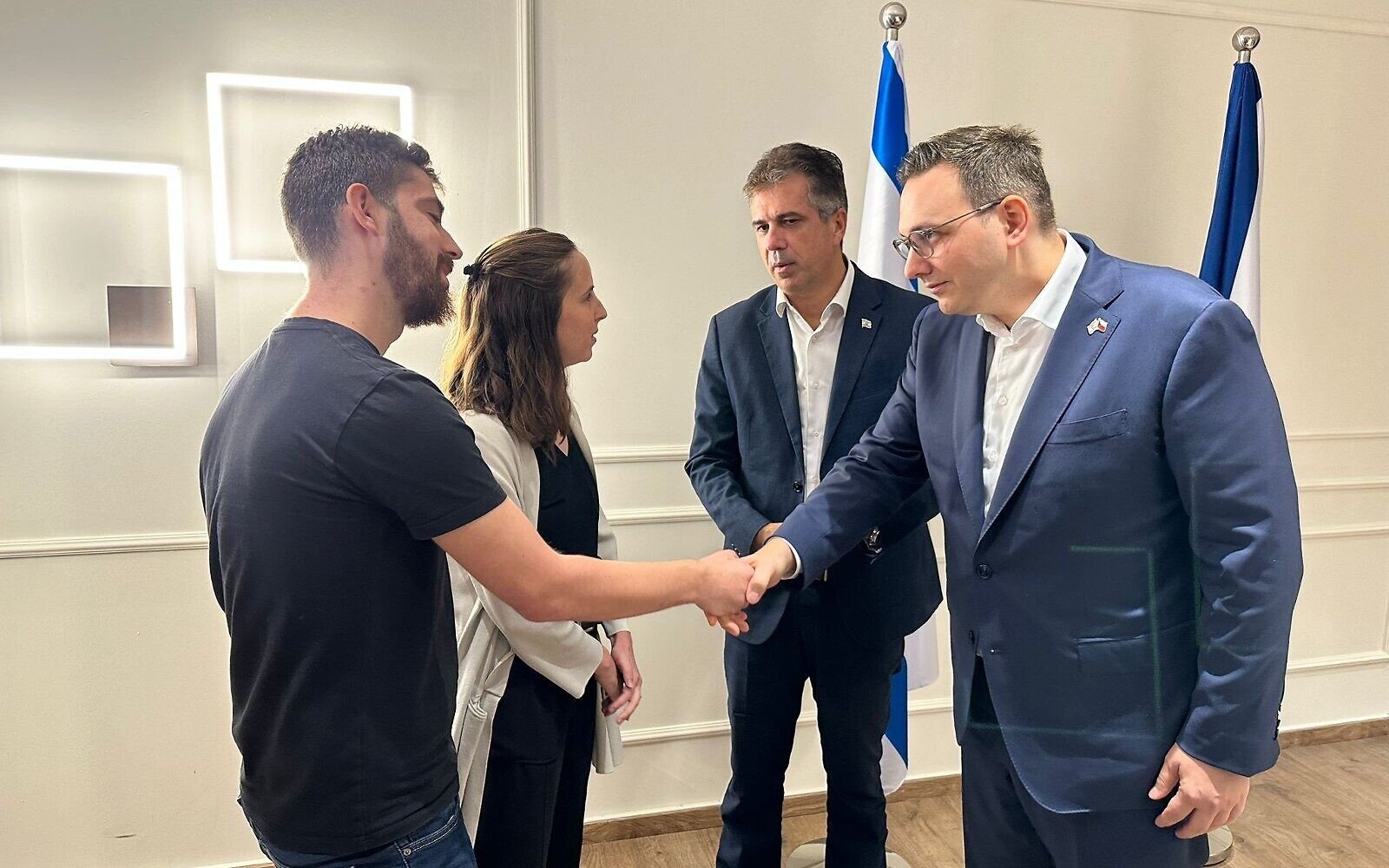
Czech Foreign Minister Jan Lipavský (far right) meets relatives of an Israeli hostage abducted in the Hamas-led October 7, 2023, attacks, alongside then–Foreign Minister Eli Cohen (second from right), during a solidarity visit to Israel on October 10, 2023. (Czech Foreign Ministry)
“Czechia never backed down on Israel during the war because we believe that Israel has the right to exist and to defend itself from its enemies,” Lipavsky said, an approach he expects will remain in place under the next Czech government.
Support amid EU divisions
Three days after Hamas invaded southern Israel on October 7, 2023, with terrorists still on the loose and Israel shaken to its core, Lipavsky became the first foreign representative to visit the reeling country.
While many of the Czech Republic’s European peers have accused Israel of violating international law in Gaza, Lipavsky placed the blame squarely on Hamas for initiating the war and for its refusal to release hostages it had abducted on that day.
“I don’t feel I’m in a position to tell Israelis how they should wage war with one of the most brutal terrorist organizations on the planet,” he said, addressing the criticism from many of his European counterparts.

Students march and wave Palestinian flags during an anti-Israel inter-university march in London on the second anniversary of the Hamas onslaught that sparked the war in Gaza, October 7, 2025. (AP Photo/Kin Cheung)
“I deeply feel for people in Gaza,” he added, while stressing that “the two years of war were the fault of Hamas, which held hostages for its own political purposes.”
Throughout the conflict, the Czech Republic emerged as one of Israel’s most consistent backers in forums like the United Nations and the EU — often in coordination with countries like Hungary, Austria, Germany and Romania.
“The time for coordination comes when we discuss matters in the UN or in the EU,” he said. “Typically in the EU, it’s not only Czechia, but many other countries which do not have this activist approach towards the Middle East — this approach to find whatever reason to punish Israel in any given situation.”
We never back down from the principle that Israel has a right to defend itself.
In those forums, Lipavsky said that Prague exercised a “cool-headed” stance, whereby “we stand by the principles of international humanitarian law… but also we never back down from the principle that Israel has a right to defend itself.”
According to Lipavsky, “Israel fulfills all the obligations made with Kaja Kallas,” referring to understandings reached between Sa’ar and the EU foreign policy chief in July to boost aid into Gaza.
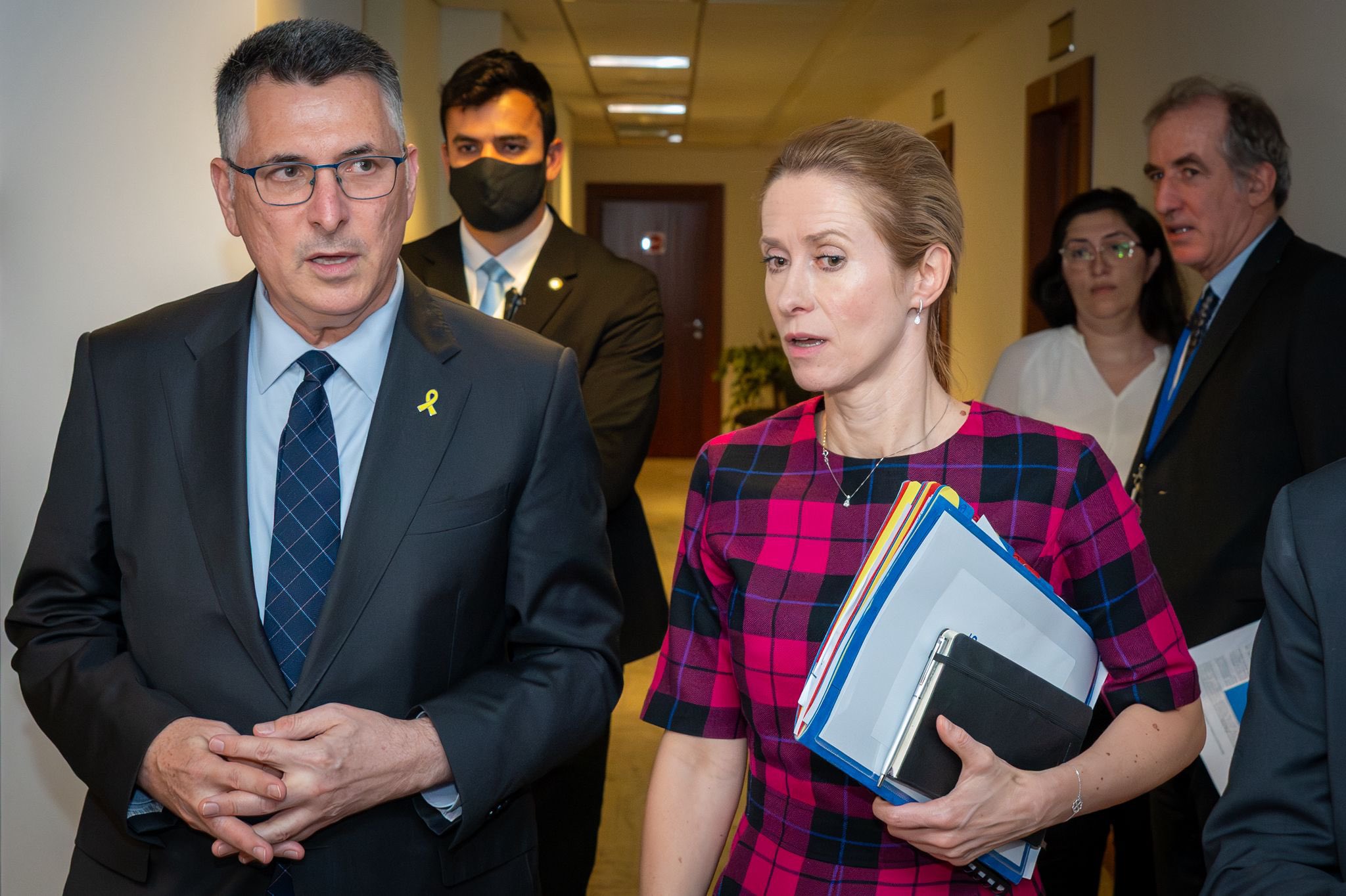
Foreign Minister Gideon Sa’ar, left, and EU foreign policy chief Kaja Kallas in Brussels on July 15, 2025. (Gideon Sa’ar/X)
“We push for humanitarian aid to be delivered to Gaza,” he added, noting that the Czech Republic has provided roughly $2 million in humanitarian aid for Palestinians this year, which is “being delivered through different international organizations,” in both Gaza and the West Bank.
Asked if the Czech Republic was pressured at any point by the administration of former US president Joe Biden or by European actors to shift its approach to Israel during the war, Lipavsky smiled.
“No. They haven’t even tried it because they knew what the answer would be,” he said.
Calm in Brussels?
According to Lipavsky, the relative calm in Gaza since the October 9 ceasefire has also eased ties between Israel and Brussels, which appeared to hit a nadir over the summer.
“I think the release of hostages [from Gaza] and the Trump peace plan really helped this region with regard to the perception in the European Union,” he said.
He described the most recent debate he attended at the Foreign Affairs Council in Luxembourg as “rather relaxed on the Middle East,” adding, “it didn’t remind me of many previous councils where many countries were calling for pressure on Israel.”
Moving forward, he encouraged strong bilateral diplomacy as the best way to improve EU-Israel ties, adding that he understands Sa’ar “is very keen” on doing so and “really taking care of that.”

A French riot policeman stands guard outside the Paris Synagogue, two days after security measures were reinforced near Jewish temples and schools, in central Paris, on October 9, 2023. (JULIEN DE ROSA / AFP)
Addressing concerns of rising antisemitism in Europe over the war, Lipavsky pointed to efforts to combat the phenomenon at home.
“We have our own issues… There is a lot of hatred, for example, on social networks, and youth radicalization is also there,” he said, adding that the Czech government recently “approved a national strategy for fighting antisemitism, which I’m very happy about. Those phenomena should be fought from the very beginning.”
No shortcuts to two states
While Hamas suffered on the battlefield during the war, Lipavsky said, it scored points diplomatically through the wave of unilateral Western recognitions of a Palestinian state — a movement the Czech Republic rejected.
“Sadly, Hamas, for a certain time, was able to politically achieve quite a lot, including the recognition of a Palestinian state by many countries, which I think was a mistake,” he said, addressing the French-Saudi-led initiative that gained momentum ahead of the UN General Assembly in September.
“The fact of the recognitions didn’t change anything for the Palestinian people. No new body was created, no new way of how matters are being dealt with, and Palestinians didn’t get any new sovereignty,” he continued.
Hamas…was able to politically achieve quite a lot, including the recognition of a Palestinian state by many countries.
What’s worse, he said the recognitions could be perceived as having “validated Hamas’s brutal war,” and having “removed part of the possible benefit from any negotiated solution” between Israelis and Palestinians.
The Czech Republic was among 12 countries that abstained from voting on a UN non-binding resolution calling for “irreversible steps” toward a two-state solution ahead of September’s French-Saudi UN summit on the matter.
The measure still passed, with 142 countries voting in favor and 10 opposed.
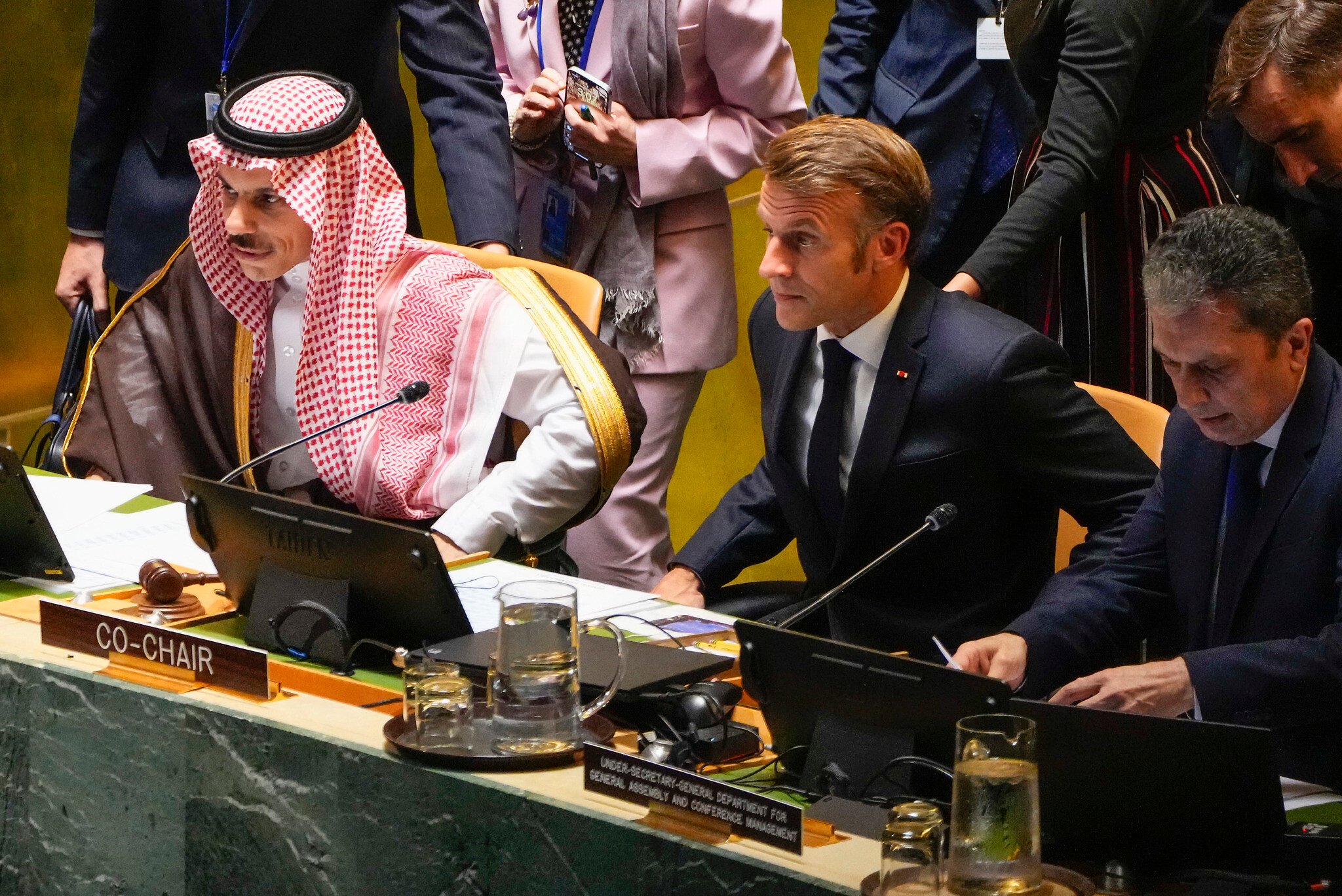
Saudi Arabia Foreign Minister Prince Faisal bin Farhan, left, and France President Emmanuel Macron, center, prepare to lead a high-profile meeting at the United Nations aimed at galvanizing support for a two-state solution to the Israeli-Palestinian conflict, Monday, Sept. 22, 2025, at UN headquarters. (AP Photo/Yuki Iwamura)
“We call for the two-state solution to be achieved, but through negotiation and in a way that Israel’s existence will not be threatened,” he said of Pargue’s choice to abstain.
The ‘axis of evil’ and Gaza’s ‘day after’
Lipavsky said that Prague’s strong backing of Israel “is being reflected by Israel’s care for our own security,” pointing to what he described as a growing recognition by Israel of the Russian threat to Europe.
He observed “a positive movement on the Israeli side towards more support of Ukraine’s struggle” against Russia, which he warned “has switched to a war economy” and continues to wage “hybrid warfare” through cyberattacks and disinformation across Europe.
He noted he felt “quite a lot of understanding and support from the Israeli side” on the issue.
Asked about his country’s policy toward Iran, he noted that “Iranians are supporting Russia in its war endeavor,” and described a broader “axis of evil” of Moscow, Tehran and Pyongyang, adding that “Iran should not be developing its nuclear program.”
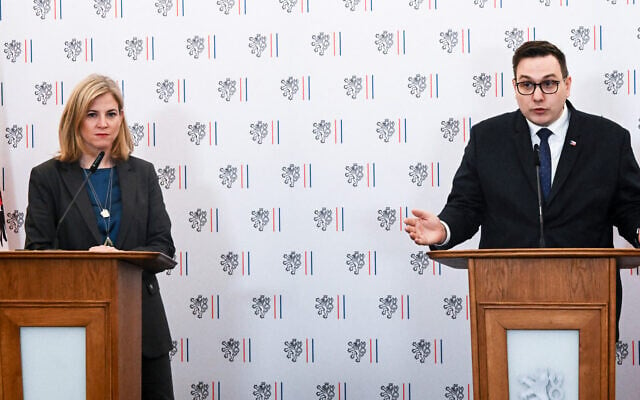
Czech Foreign Minister Jan Lipavsky, right, and his Austrian counterpart Beate Meinl-Reisinger give a joint press conference during their meeting on May 26, 2025, in Prague, Czech Republic. (Michal Cizek / AFP)
Lipavsky added that he discussed the Czech Republic’s possible involvement in Gaza’s “day after” during his meeting with Sa’ar on Thursday.
While noting that any Czech role would depend on the next government, Lipavsky said he asked for Prague to “be provided with more information — on the future of Gaza, how Gaza will be ruled, and reconstruction,” saying “We are scouting the possibilities for [the Czech Republic] to join these efforts.”
“We have this very special relationship between Czechia and Israel, which goes deep into history,” he said, adding that he expected this approach to continue under the next government.
“Other things might change, but not that,” he said.
